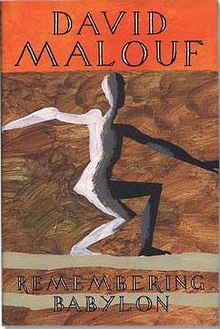Remembering Babylon

First edition
|
|
| Author | David Malouf |
|---|---|
| Country | Australia |
| Language | English |
| Publisher |
Chatto & Windus (UK) Random House (Australia) |
|
Publication date
|
1993 |
| Media type | Paperback |
| Pages | 202 pp |
| ISBN | |
| OCLC | 28290162 |
Remembering Babylon is a book by David Malouf written in 1993. It won the inaugural IMPAC Award and was shortlisted for the Man Booker Prize and the Miles Franklin Award.
The novel covers themes of isolation, language, relationships (particularly those between men), community and living on the edge (of society, consciousness, culture).
Its themes evolve into a greater narrative of an English boy, Gemmy Fairley, who is marooned on a foreign land and is raised by a group of aborigines, natives to the land. When white settlers reach the area, he attempts to move back in the world of Europeans. As Gemmy wrestles with his own identity, the community of settlers struggle to deal with their fear of the unknown.
Malouf's narrative voice is at once scattered and singular, skipping between perspectives on the same events, and forcing the reader to pay close attention to each character's rendering in order to arrive at the wholest truth possible. The magical realism theme is cultivated in the exaggerated response of all the characters to mundane items: Gemmy surrenders to what he knows is a stick instead of a gun, because he attributes Lachlan's aiming it at him as a signal of the wariness of the other settlers. The men of the community are in an uproar over a stone that visiting aborigines (supposedly) pass off to Gemmy for no logical reason—only because they fear whatever knowledge the aborigines have garnered of the land. These settlers are the first whites to live on that soil, and view anything that is not white with an extreme wariness, not only of the physical land but the spiritual sense of the place.
Gemmy is first shown at the fence between the European settlement, and the aborigine lands, about to fall onto the white side while three European children watched.
"The creature or spirit in him had spoken up, having all along had the words in there that would betray him and which, when they came hooting out of his mouth, so astonished him: Do not shoot. I am a B-b-British object."(p.33)
Gemmy contemplating Janet:
"She was a puzzle to him. He could never be sure what she was thinking. He knew the boy's thoughts because he wanted them known. His power lay in your recognizing that he possessed it. It was a power that belonged to him because he was a boy; because one day, the authority he had claimed in raising the stick to his shoulder would be real. The girl's power was entirely her own. She needed no witness to it."(p. 36)
"He was a parody of a white man."(p.39)
...
Wikipedia
